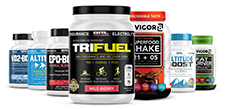How Much Protein Do You Really Need?

Protein is an essential macronutrient that plays a crucial role in building and repairing tissues, producing enzymes and hormones, and supporting overall bodily functions. However, many athletes are missing out on easy gains by not getting enough protein on a daily basis. This blog will lay out individualized protein recommendations, how activity levels affect those needs, simple ways to incorporate protein into your diet, and the consequences of consuming too little or too much protein.
Understanding Your Protein Needs
The Recommended Dietary Allowance (RDA) for protein is a general guideline that provides a baseline for daily intake. For most adults, the RDA is 0.8 grams of protein perkilogram of body weight. To calculate your protein needs, you can use the following formula:
1. Convert your weight from pounds to kilograms (divide your weight in pounds by 2.2)
2. Multiply by the RDA (multiply your weight in kilograms by 0.8 grams)
Example Calculation
For example, if you weigh 150 pounds:
1. Weight in kilograms: 150 lbs ÷ 2.2 = 68.2 kg
2.Protein needs: 68.2 kg × 0.8 g/kg = 54.6 grams of protein per day
This calculation gives you a baseline requirement, but individual protein needs can vary significantly based on several factors.
How Activity Levels Influence Protein Needs
Protein requirements can increase based on your activity level. Here’s a breakdown of recommended protein intake based on different activity levels:
- Sedentary Adults: 0.8 g/kg (standard RDA)
- Moderately Active Adults: 1.0–1.2 g/kg (light exercise, such as hitting 10k steps/day)
- Active Adults: 1.2–1.6 g/kg (intense exercise, such as running or weightlifting regularly)
- Endurance Athletes: 1.2–1.4 g/kg (for long-distance training)
- Strength Athletes: 1.6–2.2 g/kg (for building muscle mass and muscle repair)
Example for an Active Individual
Here’s the amount of protein that a 150-pound individual who is moderately active would need:
1. Weight in kilograms: 150 lbs ÷ 2.2 = 68.2 kg
2. Protein needs for active adults: 68.2 kg × 1.2 g/kg = 81.8 grams of protein per day
Special Considerations
Certain groups of people may have higher protein needs, including:
-
Pregnant and lactating women: Increased protein is necessary for fetal growth and milk production.
-
Older adults:Higher protein intake can help prevent muscle loss and promote overall health.
Simple Ways to Get Protein Throughout the Day
Incorporating protein into your diet doesn’t have to be complicated! Here are some easy strategies to ensure you meet your protein needs:
1. Start with Breakfast
Incorporate eggs, greek yogurt, or a protein smoothie. These options are great sources of protein and will satiate your hunger until lunchtime.
2. Snack Wisely
Choose protein-rich snacks such as nuts, seeds, string cheese, or hummus with veggies. These options can help maintain your protein intake throughout the day.
3. Opt for Lean Proteins
Include chicken, turkey, fish, tofu, or legumes in your meals. These versatile proteins can be grilled, baked, steamed, fried, or slow-roasted, helping you avoid palette fatigue.
4. Add Protein to Meals
Incorporate protein powder such as the Invigor8 Superfood Shake into smoothies, oatmeal, or yogurt bowls. It’s a convenient way to boost your intake while minimizing time spent in the kitchen.
5. Plan Meals
Prepare meals in advance that include protein-rich foods to ensure you’re meeting your daily needs without scrambling at mealtime.
What Happens If You Eat Too Little or Too Much Protein?
Consequences of Insufficient Protein Intake
Not getting enough protein can lead to a variety of health issues, including:
-
Muscle Loss: Insufficient protein can lead to muscle wasting, especially inolder adults or those with sedentary lifestyles.
-
Weakened Immune Function:Protein is essential for the production of antibodies and other immune system components. Low intake can compromise your immune response.
-
Fatigue and Weakness:Protein is vital for energy levels; low intake can lead to feelings of fatigue and reduced strength.
Risks of Excessive Protein Intake
While protein is essential, consuming too much can also have negative effects:
-
Kidney Strain: Excessive protein can put stress on the kidneys, especially in individuals with preexisting kidney conditions. Consult with a dietitian and your doctor before altering protein intake or taking supplements.
-
Digestive Issues:High protein intake, particularly from animal sources, can lead to digestive discomfort and constipation if you don’t get enough fiber. If you experience this, consider trying out plant-based protein.
-
Nutrient Imbalance: Focusing too heavily on protein may lead to a lack of other essential nutrients, such as carbohydrates and fats, which are also crucial for overall health.
Take the next step in your training regimen: Try any BRL Sports supplement risk-free! If our natural nutritional products aren’t the best you’ve ever used, simply return your purchase for a 100% refund — no questions asked!
Also in Inspiration & Perspiration

High Altitude Supplements: Complete Guide to Training & Prevention (Altitude Sickness Solutions)
Support endurance and reduce altitude stress with supplements that improve oxygen efficiency, stamina, and recovery in high-altitude conditions.

Best Supplements For Runners: Complete Guide By Training Phase (Base, Peak, Taper & Race Day)
Discover the best supplements for runners by training phase—base, peak, taper, and race day—to boost endurance, recovery, and performance.

Creatine for Endurance vs. Sprint Efforts
Creatine isn’t just for power—learn how it boosts sprint speed, recovery, and endurance performance.


